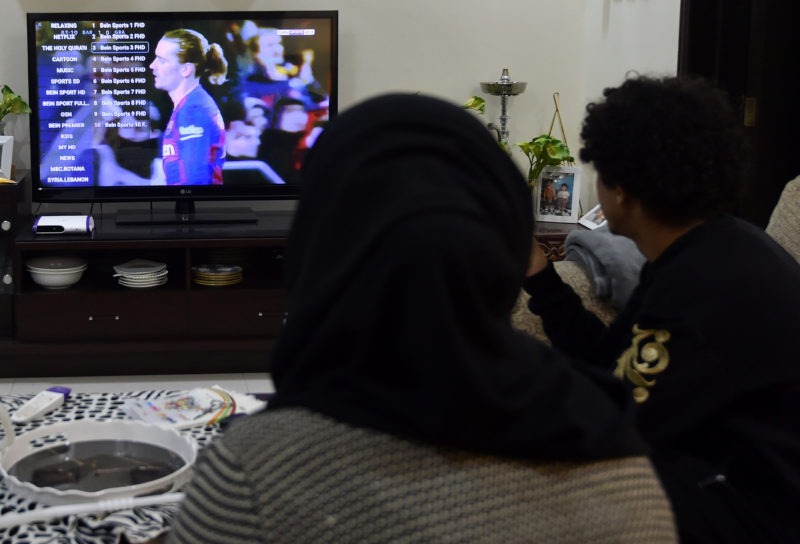Saudi fans navigate Gulf rift to keep sport on screens
A family dodges an embargo by watching Qatar’s beIN Sports channel at their home in the Saudi capital Riyadh (FAYEZ NURELDINE)
Riyadh (AFP) – Diehard Barcelona fan Abdulrahman had to find a creative way to keep watching football matches — paying his subscription via Kuwait to dodge a diplomatic rift between Riyadh and Doha that separates Saudis from their favourite sports.
Subscribing to Qatar’s beIN Sports, the Arab world’s leading sports channel which has exclusive rights to Spain’s LaLiga and other key tournaments, has become extremely difficult for Saudi fans since the kingdom’s 2017 boycott of Qatar.
Just days after Riyadh and its allies cut ties, Saudi Arabia banned the sale and distribution of beIN receivers and blocked Qatari websites as well as all transactions with its former ally.
For Abdulrahman, a young lawyer who preferred to use his first name due to the sensitivity of the issue, the diplomatic divide became a major inconvenience, forcing him to search for a solution.
“I had to transfer money to a friend in Kuwait so he can renew my subscription from there,” said Abdulrahman, who was fortunate enough to possess a receiver before the ban.
Alongside LaLiga, the sports channel has exclusive football rights for the top English, Italian, German and French leagues, as well as the Champions League and World Cup.
It also shows basketball’s top flight, the US National Basketball Association, the EuroLeague and many other competitions across tennis, boxing, volleyball and more.
“beIN Sports covers all tournaments and championships. It is everything… in sports,” 25-year-old Abdulrahman told AFP. “I cannot forsake beIN Sports, which plays at home practically 24 hours a day.”
Others in the kingdom, such as Egyptian national Abdulmonem, use a virtual private network (VPN) to renew their subscription online.
“I bypassed the block of the beIN website by using a VPN and bypassed the ban on transactions (to Qatar) by using PayPal to renew my subscription,” he told AFP.
– ‘Devil’s Street’ –
Demand for beIN in Saudi Arabia, which itself is investing heavily in sports events to exert soft power and relay a more positive image abroad, remains high despite the boycott.
To meet that demand, a black market for subscriptions has emerged — at inflated prices.
Satellite services shops line Al-Hamdani Street in Riyadh, an area known for decades to conservative Saudis as “Devil’s Street” due to its sale of equipment giving access to pornographic or other illicit content.
Salesmen, mostly Asian expatriates, swarm the area, muttering discreetly the same question to passersby: “Want to renew your beIN subscription?”
The shops carry no signs or logos of the Qatari broadcaster, and while the annual cost of the subscription should only be 1,125 riyals ($300), the best offer on Devil’s Street was 1,400 riyals.
“We cannot deal directly from Saudi Arabia with the network in Qatar, so we act as middle men,” said one shopkeeper, who spoke on condition of anonymity.
“But we can renew existing subscriptions through agents abroad or provide new ‘smuggled’ receivers,” he told AFP.
– Bootlegging –
Saudi authorities did not reply to AFP’s request for comment on the ban of beIN subscriptions and whether there was any plan to review it.
beIN has alleged that since August 2017 a vast and sophisticated Saudi bootlegging network known as “beoutQ” has been illicitly transmitting programmes via Riyadh-based satellite provider Arabsat — a claim Saudi Arabia denies.
BeoutQ stopped airing on television in August but is still available online.
Many Riyadh cafes broadcast beoutQ to meet the demands of their customers.
According to a beIN Sports spokesman, Saudi Arabia was the biggest market in the Middle East and North Africa (MENA) “by a significant margin” before the blockade.
“The real victims in all of this are the passionate Saudi sports fans,” the spokesman told AFP.
beIN launched an international investment arbitration for damages of over $1 billion against the Saudi kingdom in October 2018, but legal wrangling continues over where the case could be heard.
“In June last year we were forced to let go almost 20 percent of our MENA workforce,” the beIN spokesman said.
Abdulrahman refuses to resort to beoutQ, saying that glitchy online platforms are no replacement for watching his beloved Barcelona “with ease” on television.
“As a football fan, I have fallen victim to a political crisis which I have nothing to do with,” he said.
Disclaimer: Validity of the above story is for 7 Days from original date of publishing. Source: AFP.


